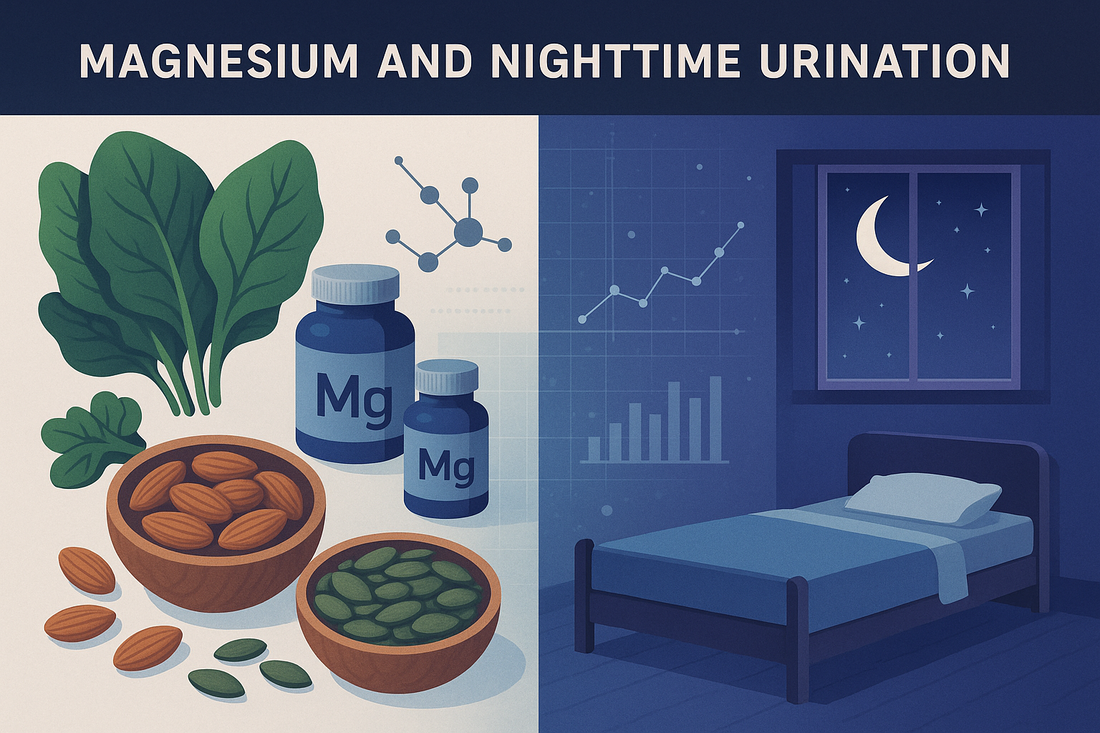
Magnesium and Nighttime Urination: What Research Actually Shows
If you are waking up multiple times each night to use the bathroom, you may be dealing with something commonly known as nocturia. This condition is defined as waking from sleep to urinate, with each trip followed by returning to sleep.
Nocturia affects 5–15% of adults under 50, 20–30% between 50–70, and over 50% above 60. Nocturia not only disrupts rest but also raises fall risk in older adults, contributing to nearly 25% of nighttime falls.
The causes are varied, ranging from evening fluid intake, caffeine, sleep apnea, medications, prostate or pelvic floor issues, to an overactive bladder. With so many possible drivers, people often wonder if a simple nutrient like magnesium could make a difference. Let’s walk through what the research really shows.
Quick Takeaways
- Magnesium helps relax muscles, including the bladder’s detrusor muscle, which may reduce urgency and frequency
- Small clinical trials have found magnesium supplementation improved urgency and reduced nighttime bathroom trips by ~0.5 episodes per night
-
Population studies show lower magnesium status is linked with a higher risk of bladder symptoms, but these are associations, not proof
Why Magnesium Could Matter for Nighttime Urination
The bladder’s detrusor muscle contracts when calcium enters smooth muscle cells. Magnesium is a natural calcium antagonist, blocking some of that flow and calming muscle contractions. In theory, this may reduce urgency and limit nighttime awakenings.
However, nocturia is not always bladder-driven. In many people, the main cause is nocturnal polyuria, or overproduction of urine at night. In others, sleep fragmentation amplifies bladder signals. In these cases, magnesium’s direct muscle-relaxing effect may not help much, but its role in improving sleep quality could still be beneficial.
What Clinical Studies Actually Show

Direct Bladder Effects
Magnesium has been tested in a handful of small randomized controlled trials, mainly in women with urgency or detrusor overactivity. While limited, these studies suggest it can modestly reduce nighttime urination and improve bladder symptoms:
-
In one double-blind, placebo-controlled trial of 40 women, 55% of those taking magnesium hydroxide reported symptom improvement compared to 20% on placebo.
-
A second RCT involving 60 women given 350 mg magnesium hydroxide twice daily for 4 weeks showed:
- Nighttime urination episodes decreased from 1.8 to 1.3 per night (statistically significant).
- Daytime bathroom trips dropped from 12.4 to 10.4.
- Urgency and incontinence scores improved, and urodynamic testing confirmed reduced bladder overactivity
Taken together, these results suggest magnesium may have a direct role in calming an overactive bladder. However, because trials were small, short in duration, and conducted only in women, the evidence is still preliminary and not broadly generalizable.
Observational Research
Beyond small clinical trials, larger observational studies have linked low magnesium status to higher rates of bladder symptoms. These studies do not prove cause and effect, but the associations are consistent:
- Each 1-point increase in the Magnesium Depletion Score (MDS) was tied to an 11% higher prevalence of overactive bladder.
- People with higher MDS values reported more urgency and incontinence, especially when they already had bladder issues
-
Diets higher in magnesium intake were generally linked with better urinary health outcomes
These findings are correlational, not causal. Low magnesium could simply reflect poor diet or chronic illness, both of which independently worsen urinary health.
Sleep Quality and Indirect Effect

Magnesium may also reduce nighttime bathroom trips indirectly by improving sleep quality.
- A meta-analysis of randomized trials in older adults (151 participants) found magnesium shortened the time it took to fall asleep by about 17 minutes and modestly improved overall sleep efficiency
- In another 8-week study of 71 people, those taking magnesium reported a 32% improvement in sleep quality compared to 16% in the placebo group
-
Other trials show magnesium can raise melatonin and lower cortisol levels, providing a biological explanation for these effects
While not conclusive, these findings suggest magnesium’s sleep-supportive role may indirectly help some people with nocturia by reducing nighttime awakenings.
Safety Considerations
- For most healthy adults, magnesium is generally safe when used appropriately
- Possible side effects: diarrhea, abdominal cramping, electrolyte shifts.
- High-risk groups: people with advanced kidney disease, or those on certain antibiotics and osteoporosis drugs (magnesium can interfere with absorption)
How a Bedside Portable Urinal Supports Nocturia Management
Nocturia isn’t just about lost sleep, it’s about safety. Each trip to the bathroom at night increases fall risk, especially in older adults. A bedside option like the SleepPee portable urinal offers practical relief:
- Reduces fall risk by eliminating nighttime trips across dark rooms.
- Helps preserve sleep by allowing a faster return to rest.
- Designed for elderly people, the device is discreet and comfortable to use.
-
Supports independence without relying on caregivers
Even with improvement, having SleepPee nearby adds safety and convenience.
A Sensible Way to Try Magnesium
- Rule out lifestyle drivers (caffeine, alcohol, and late fluids).
- Record baseline with a bladder diary.
- If urgency or OAB is present, discuss magnesium with your provider.
-
Trial for 4 weeks while tracking symptoms.
- Reassess: continue if improved, stop if no benefit.
Practical Path Forward in Bladder Health and Sleep

Small trials show modest reductions in nocturia with magnesium, about half a trip fewer per night, and population studies suggest low magnesium status is linked with more bladder symptoms. But the evidence base is still small and preliminary.
For now, magnesium is best seen as a supportive option, not a cure-all. The most effective approach combines core lifestyle strategies, a practical safety solution like the SleepPee bedside urinal to reduce nighttime risks, and, when appropriate, magnesium supplementation. For some, especially those with urgency or low magnesium status, this combined approach may help reduce nighttime bathroom trips while improving both sleep and safety.
